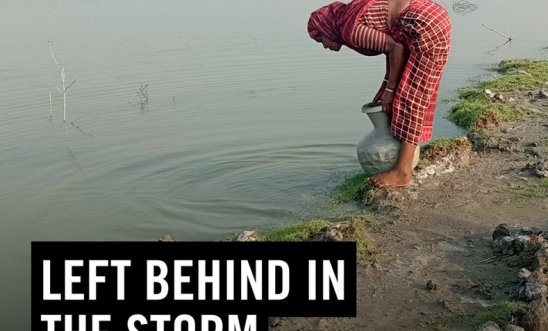
Bangladesh: Dalit Women Sanitation Workers and the Fight for Water and Dignity

Written by Jerry Allen, Country Coordinator for Sri Lanka and Bangladesh
This Blog is based on a press release from the Amnesty International South Asia Regional Office.
A new report, ‘Left Behind in the Storm: Dalit Women Sanitation Workers and the Fight for Water and Dignity’, documents the huge barriers faced by Dalit (sometimes called “Untouchable”) women sanitation workers on Bangladesh’s south-western coastal belt, in accessing safe drinking water and adequate sanitation. It also highlights their vulnerability and exclusion in climate change relief programmes. These workers are largely invisible in government policies on climate change, water and sanitation due to their caste, gender and occupation, despite being among the most affected by these policies.
Bangladesh’s authorities must uphold the rights of Dalit sanitation workers, who face economic marginalization and entrenched gender- and caste-based discrimination, vulnerabilities that are only deepening amid a global climate crisis.
“As one of the most climate-vulnerable countries in the world, Bangladesh must address the deep-rooted caste inequalities that have left economically excluded and marginalised coastal Dalit communities bearing the brunt of the climate emergency,” said Isabelle Lassée, Deputy Director Research for South Asia at Amnesty International.
The report is based on interviews with 20 female and two male sanitation workers from Dalit communities in Khulna and Satkhira, located in low-lying, flood-prone areas that are highly exposed to the climate change related impacts of rising sea levels, cyclones, droughts, and flooding.
“We low caste are forgotten”
Sanitation workers reported having no household water connections for drinking, washing, cooking and cleaning. Instead, many are forced to either purchase and carry water from distant treatment centres, or to collect rainwater or use public wells or pond water – with unsafe water causing a range of health problems. The cost of buying safe drinking water was another barrier, especially for families earning as little as 3,000 to 8,000 taka (£20-£50) a month.
“There is no water infrastructure, no tankers, or machines … I think we low caste people are forgotten,” one sanitation worker told Amnesty International.
Dalit women sanitation workers face challenges specific to their gender. As women, they bear the burden of water collection, an unpaid and labour-intensive chore, which limits their economic opportunities.
Toilets that sanitation workers can afford to build offer no privacy, are difficult to access, and are not resilient to weather and climate events. Many women sanitation workers delay using the toilet due to a lack of safety or privacy, leading to infections. Others struggle to manage their menstrual hygiene.
Vulnerability to climate change
The report documents how extreme weather events, made more frequent and severe by climate change, further magnify existing inequalities, trapping sanitation workers in coastal regions in a cycle of vulnerability. With 18 cyclones over 17 years, entire settlements have been caught in cycles of rebuilding they cannot afford.
Urgent interventions are needed to strengthen climate resilience policies and to address loss and damage through the lens of caste and gender. Bangladesh’s adaptation frameworks must not continue to reinforce systemic inequalities and exclusion.
Neglected by assistance programmes and excluded from decision-making
Dalit sanitation workers have an essential role in maintaining public health and sanitation infrastructure, and in post-disaster recovery efforts. Yet they are seldom included in decision-making related to these areas and are denied access to the very services they help sustain.
After, Cyclone Remal, government assistance programmes in Khulna and Sathkira failed to prioritise Dalits and to account for barriers to inclusion. This includes entrenched systemic caste-based discrimination and the lack of documentation for land settlement in areas prone to flooding. This often leaves frontline workers unprotected and forgotten.
Bangladesh is obligated under both the UN International Covenant on Economic, Social and Cultural Rights (ICESCR), to ensure marginalised groups' right to water and sanitation and the UN International Convention on the Elimination of Racial Discrimination (ICERD) to adopt proactive measures to eliminate structural discrimination and guarantee equal access to all human rights.
The authorities must collect and monitor caste-disaggregated data, establish a National Action Plan to eliminate caste-based discrimination and ensure substantive equality and meaningful participation of Dalit women in decision-making processes including with respect to water and sanitation planning.
The Bangladeshi government must adopt a comprehensive anti-discrimination law that includes caste discrimination, applies to both public and private sectors, recognises direct and indirect discrimination and provides for accessible independent complaint mechanisms and effective legal remedies.
Amnesty International Statement
“Caste and gender-based discrimination, lack of inclusive infrastructure, economic marginalization, and climate vulnerability have converged to entrench cycles of exclusion and indignity,” said Isabelle Lassée.
“The findings by Amnesty International reflect a deeper national failure to uphold the rights of Dalit sanitation workers.”
Please see the full report : https://www.amnesty.org/en/documents/asa13/0372/2025/en/
Our blogs are written by Amnesty International staff, volunteers and other interested individuals, to encourage debate around human rights issues. They do not necessarily represent the views of Amnesty International.
0 comments